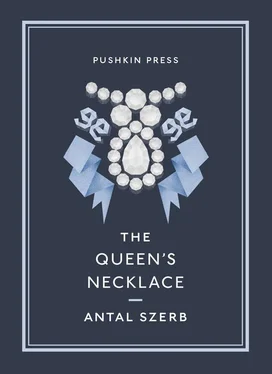When, in March 1785, Marie-Antoinette attended the thanksgiving service held in Notre Dame for the birth of her second son, the Duc de Normandie, she was received by the crowd in icy silence. She returned to Versailles in tears.
“ Mais que leur ai-je donc fait? ”—But what have I done to them? — she asked her companions, in bewilderment.
For a year now, ever since the affair of the necklace, she had been so passionately hated by all sections of society that the kindly old Duc de Penthièvre advised the King to lock her up in the nunnery at Val-de-Grace in the interests of public order.
Mais que leur ai-je donc fait? What had given rise to such bottomless hatred?
According to the brothers Goncourt, it originated in the Court, from where it was skilfully fostered, and made its way out into an ever-widening sphere. We have already discussed why the majority of courtiers so disliked her: the more elderly, because she was young and so much at ease with younger people; the zealots, for the general gaiety of her life; the ‘old French’ party, because she stood for the Austrian connection; those who did not belong to the Polignac circle, because they felt themselves slighted; and everyone else, because the witty superiority of her entourage diminished their self-esteem.
History provides many examples of courtiers taking to a new queen with less than total enthusiasm, but it is unusual for them to foment such powerful and far-reaching intrigues against one; and it is quite without parallel for them to involve the common people. This itself was a sign of the times. But it is more than that. Not only does it suggest that public opinion had become a factor in a purely internal palace revolution; it also shows the extent to which the Court had lost its political instinct. Its chief source of strength was now to make common cause against the authority of the King with his greatest enemy, the mob. That alone would have been enough to bring down judgement on the leading section in society. Had the power of the aristocracy not been ended by the Revolution, it would have collapsed of its own accord, precisely because it had lost its most fundamental instinct, its whole raison d’être, which derived from the same instinct that brought it to leadership in the first place: its capacity to survive.
If we were to ask a sober-minded French citizen of the time what his complaint against the Queen was, he would no doubt have summarised it under three headings: her extravagance, her immoral life and her lack of patriotism. The first charge — whether founded or not — we have explored elsewhere. The second we touched on in the discussion of the vast number of lovers she was imagined to have. And of course, after the necklace trial, this particular accusation was greatly reinforced by the influence of the literary productions of Jeanne de la Motte and the pamphleteers.
By this stage there was nothing the Queen could do to stop those Parisians with filthy minds and the souls of concierges instantly ‘seeing through’ her schemes for debauchery. If the Queen was so fond of spending her summer evenings out on the terraces overlooking the park at Versailles, it was perfectly clear what she got up to in the dark … Thus it rapidly got abroad that she and her intimate circle — Coigny, Vaudreuil, Besenval and the rest — had ordered costumes representing wild animals, and “after dressing up as harts and hinds, had strayed through the park, giving themselves up to the pleasures of harts and hinds”. That could only speak for itself. According to others, Marie-Antoinette would wander through the Versailles gardens dressed as an Amazon, offering herself to anyone — man or woman — she came upon. One young man in particular, an official from the War Ministry, a real Adonis, had caught her eye, but Artois became jealous, the young man vanished without trace shortly afterwards, and his family never saw him again. And so on, and on, and on …
Popular opinion demeaned and besmirched her gaiety of spirit, her love of a beautiful and freer-flowing life, her desire for friendship, and the innocent flirtatiousness by which she sought to please everyone: in short, les plus belles vertus de sa jeunesse —the loveliest qualities of her youth — as the brothers Goncourt put it. But even if the Queen were not a Vestal Virgin, did that really deserve such moral outrage from the not-so-puritanical French? “It was a strange kind of censoriousness,” the brothers exclaim, and they are right to do so, “that even in the so-called century of women the Queen was to be forgiven nothing that expressed real femininity.” French historians of this most frivolous of periods seem to tolerate everyone else’s peccadilloes as something to be expected, and find them perfectly natural — so why not those of their queens?
The answer to this question becomes clear when we confront the third of these accusations. The French did not dislike Marie-Antoinette because she was immoral. On the contrary, they found her immoral, and piled the decaying products of their basest fantasies on her, because they did not like her … And the chief reason why they disliked her, it seems to us, can only have been that she wasn’t French.
The Queen, it cannot be denied, was bound by a thousand ties, emotional and political, to the house of her birth and the powerful family from which she had come. Sanguine by nature, it never occurred to her for a moment that the interests of the two allies, Austria and France, might not always exactly coincide. Public opinion, which had never felt much enthusiasm for the Austrians (the French had always passionately hated any alliance with them) exaggerated her links with that country, spoke of the millions of livres she sent back to her brother, and took great delight in passing on stories by word of mouth, such as the following:
When Joseph II of Austria ordered the closure of the Schelde corridor, Marie-Antoinette defended him with all her might before the French Court, and told the Foreign Minister Vergennes:
“All you ever think about the Emperor is that he is my brother.”
To which he replied:
“I do always bear it in mind. But before all else I have to consider that Monsieur the Dauphin is your son.”
France was a closed society, in which outsiders had no place. There has never been a European country in which foreigners were shown less sympathy. A foreign-born queen, tainted with foreign interests, could never be popular, and when the hostility towards her reached its peak, the very worst term of abuse they could find for her was L’Autrichienne : ‘that Austrian woman’.
This fact can perhaps only be fully understood, and felt on the skin, by people from outside the country. If someone in Hungary remarks that “You’re not Hungarian”, it is of course not exactly flattery, but nor is it necessarily an insult. It could be a simple statement of fact. If an Englishman happens not to be pure English, and has Scots or Welsh blood in his veins, he will be openly proud of it. But if someone in France tells you, “You are not French!” it denotes something lacking, some fundamental moral deficiency. You probably go around at night with a false beard stealing small change from the caps of blind beggars, are furthermore physically deformed, and carry Lord knows what weapons concealed beneath your garments; in short, you are a subhuman creature, though rather less likeable than an animal.
As can be imagined, this powerful French xenophobia may well have been the basis of Marie-Antoinette’s unpopularity.
However, as we have said, Marie-Antoinette was neither a demon, as the Revolution painted her, nor the angel portrayed by the counter-revolution. Perhaps Stefan Zweig is right: the real problem was that she was simply mediocre. Her final martyrdom is very touching, but there really is nothing in her life to make us think of her with particular veneration or emotion. As we take our leave of her, we should quote, in their original beauty, the words of Lamartine, in which he characterises her as follows:
Читать дальше












